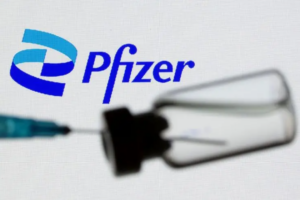
Pfizer: has increased the supply of new crown oral drug in China up to millions of treatment volumes, will switch to self-payment from April
On Jan. 31, Pfizer Inc. released its full-year and fourth-quarter 2022 financial results. According to the report, Pfizer’s 2022 revenue was US$100.3 billion, up 23% year-over-year, with the new crown vaccine Comirnaty and the new crown oral drug Paxlovid becoming the company’s revenue drivers. Comirnaty revenue was $37.8 billion, up a modest 3% year-over-year, while Paxlovid revenue was $18.9 billion. Together, the two products accounted for $56.7 billion in revenue, or 57% of total revenue.
However, Pfizer’s 2023 earnings guidance released shows that the company expects revenues of $67 billion to $71 billion in 2023. The midpoint of this revenue range is down 31 percent compared to 2022. Pfizer said this is entirely due to lower expected revenue from the new crown products. Pfizer expects revenues of $13.5 billion and $8 billion for Comirnaty and Paxlovid, respectively, in 2023, down 64% and 58% year-over-year, respectively. Pfizer said it expects that segment of revenue to enter a trough in 2023, as the government still has a large inventory of new crown products, although it will grow again in 2024.
For the China market, Pfizer revealed that it has increased its supply of Paxlovid in China to millions of treatment volumes and that starting in April this year, Paxlovid will no longer be paid for by Medicare in China and will next be targeted primarily at the private out-of-pocket market.
Paxlovid was granted emergency conditional import registration by the State Drug Administration in February 2022 for the treatment of adults with mild to moderate neovirus pneumonia with high risk factors for progression to severe disease. Subsequently, Paxlovid entered the treatment protocol for neocoronavirus infection released in March 2022.
Initially, however, Paxlovid was not available for clinical use in China, and supply was not smooth. As a new but uncertain market opportunity, Pfizer said it supplied tens of thousands of courses of Paxlovid to China in 2022. after the relevant domestic policy adjustment in December 2022 to March this year, Pfizer significantly increased the supply of Paxlovid to China to millions of courses of treatment. Currently, Paxlovid’s hard-to-find one-drug situation has been alleviated.
Previously, however, Paxlovid failed in the national health insurance negotiations in early January this year. Currently, the time limit for the drug to be included in the temporary health insurance reimbursement coverage is March 31 this year. Pfizer said that Paxlovid will target the private self-pay market in China starting this April. Notably, the above assumptions for Paxlovid’s performance guidance are premised on excluding Paxlovid’s sales in China. In other words, Pfizer may expect that Paxlovid sales in the domestic self-funded market will not be significant.
Currently, five small molecule oral anti-neo-coronavirus drugs have been approved in China. In addition to Paxlovid, there are also Henan Real Biological’s Azulfidine, Merck Sharp & Dohme’s Monoravir, Junshi Biological’s Deuterium Rimadevir Hydrobromide (trade name: Mindvir), and Centron Pharmaceutical’s Centronavir Tablets/Ritonavir Tablets Combo Package (trade name: Centronixin). Among them, Paxlovid and Monoprevir are used to prevent progression to severe disease in infected patients with high-risk factors, while the other three domestic drugs are used to improve and eliminate symptoms of new coronary infections.
In terms of price, Paxlovid also topped the list, with its price dropping from an initial RMB 2,300/box to RMB 1,890/box. The listed prices for the other drugs were RMB 1,500/box for Monoravir capsules, RMB 750/box for Xianoxin and RMB 270/box for Azulfidine tablets. At present, Pfizer and its partner Huahai Pharmaceutical are also promoting the local production of Paxlovid in China.
Pfizer’s other New Crown hot product, Comirnaty, includes the mRNA New Crown vaccine (BNT162b2) and the mRNA New Crown bivalent vaccine. It was developed by German vaccine company BioNTech (BioNTech), and Pfizer is responsible for its commercialization in most countries and regions outside of Greater China. The exclusive rights to develop and commercialize the vaccine in China were granted to Fosun Pharma (trade name: Fubitai). In March 2021, Fubitai was included in the government vaccination program in Hong Kong and Macau. As of January this year, Fubitai bivalent mRNA vaccine has been approved in Hong Kong and Macau, and people from the Mainland have also visited Hong Kong and Macau to receive the vaccine at their own expense.


Average Rating